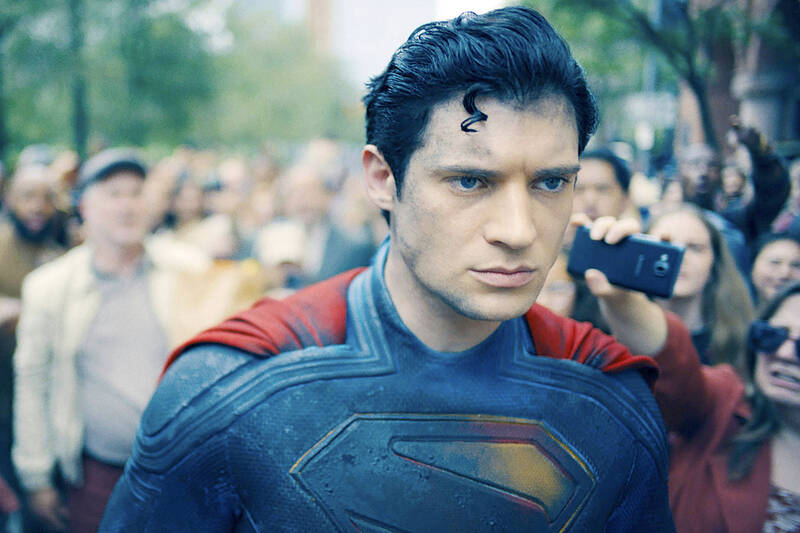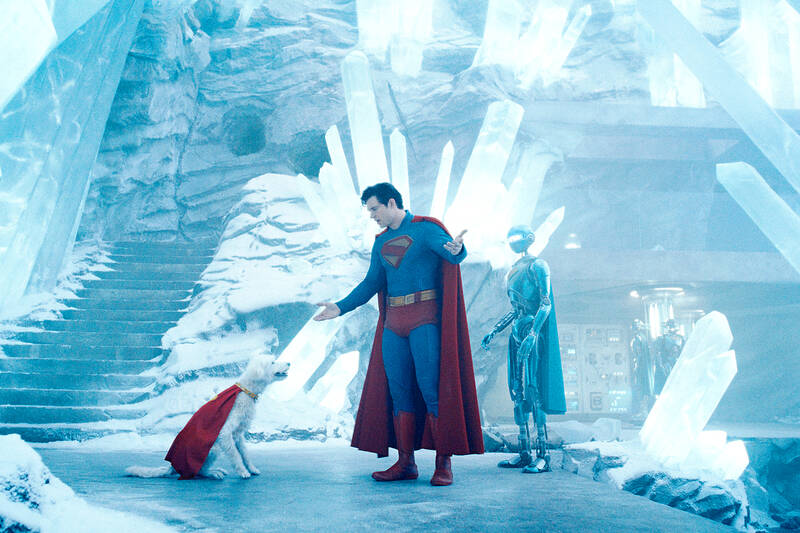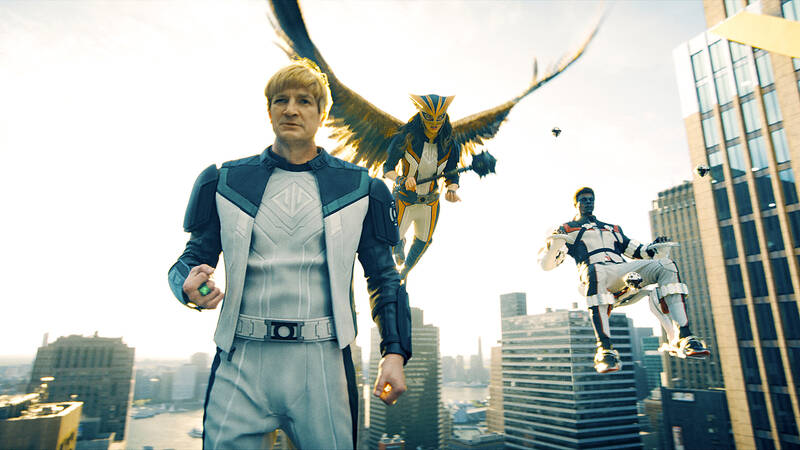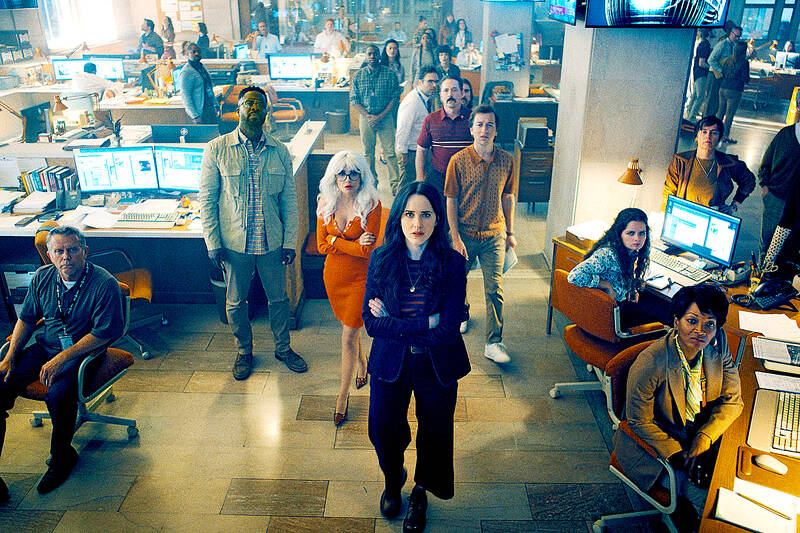Writer-director James Gunn’s Superman was always going to be a strange chemistry of filmmaker and material. Gunn, the mind behind Guardians of the Galaxy and The Suicide Squad, has reliably drifted toward a B-movie superhero realm populated (usually over-populated) with the lesser-known freaks, oddities and grotesquerie of back-issue comics.
But you don’t get more mainstream than Superman. And let’s face it, unless Christopher Reeve is in the suit, the rock-jawed Man of Steel can be a bit of a bore. Much of the fun and frustration of Gunn’s movie is seeing how he stretches and strains to make Superman, you know, interesting.
In the latest revamp for the archetypal superhero, Gunn does a lot to give Superman (played with an easy charm by David Corenswet) a lift. He scraps the origin story. He gives Superman a dog. And he ropes in not just expected regulars like Lois Lane (Rachel Brosnahan) and Lex Luthor (Nicholas Hoult) but some less conventional choices — none more so than that colorful jumble of elements, Metamorpho (Anthony Carrigan).

Photo: AP
Metamorpho, a melancholy, mutilated man whose powers were born out of tragedy, is just one of many side shows in Superman. But he’s the most representative of what Gunn is going for. Gunn might favor a traditional-looking hero at the center, like Chris Pratt’s Star-Lord in Guardians of the Galaxy. And Corenswet, complete with hair curl, looks the part, too. But Gunn’s heart is with the weirdos who soldier on.
The heavy lift of Superman is making the case that the perfect superhuman being with “S” on his chest is strange, too. He’s a do-gooder at a time when no one does good anymore.
Not everything works in Superman. For those who like their Superman classically drawn, Gunn’s film will probably seem too irreverent and messy. But for anyone who found Zack Snyder’s previous administration painfully ponderous, this Superman, at least, has a pulse.

Photo: AP
It would be hard to find a more drastic 180 in franchise stewardship. Where Snyder’s films were super-serious mythical clashes of colossuses, Gunn’s Superman is lightly earthbound, quirky and sentimental. When this Superman flies, he even keeps his arms back, like an Olympic skeleton rider.
We begin not on Krypton or Kansas but in Antarctica, near the Fortress of Solitude. The opening titles set-up the medias res beginning. Three centuries ago, metahumans first appeared on Earth. Three minutes ago, Superman lost a battle for the first time. Lying bloodied in the snow, he whistles and his faithful super dog, Krypto, comes running.
Like some of Gunn’s other novelty gags (I’m looking at you Groot), Krypto is both a highlight and overused gag throughout. Superman is in the midst of a battle by proxy with Luthor. From atop his Luthor Corp skyscraper headquarters, Luther gives instructions to a team sitting before computer screens while, on a headset, barking out coded battle directions to drone-assisted henchmen. “13-B!” he shouts, like a bingo caller.

Photo: AP
Whether this is an ideal localizing of main characters in conflict is a debate that recedes a bit when, back in Metropolis, Clark Kent returns to the Daily Planet. There’s Wendell Pierce as the editor-in-chief, Perry White, and Skyler Gisondo as Jimmy Olsen. But the character of real interest here is, of course, Lois.
She and Kent are already an item in Superman. When alone, Lois chides him over the journalistic ethics of interviewing himself after some derring-do, and questions his flying into countries without their leaders’ approval. Brosnahan slides so comfortably into the role that I wonder if Superman ought to have been Lois, instead. Her scenes with Corenswet are the best in the film, and the movie loses its snap when she’s not around.
That’s unfortunately for a substantial amount of time. Luthor traps Superman in a pocket universe (enter Metamorpho, among others) and the eccentric members of the Justice Gang — Nathan Fillion’s Green Lantern, Edi Gathegi’s Mister Terrific and Isabela Merced’s Hawkgirl — are called upon to lend a hand. They come begrudgingly. But if there’s anyone else that comes close to stealing the movie, it’s Gathegi, who meets increasingly absurd cataclysm with wry deadpan.

Photo: AP
The fate of the world, naturally, again turns iffy. There’s a rift in the universe, not to mention some vaguely defined trouble in Boravia and Jarhanpur. In such scenes, Gunn’s juggling act is especially uneasy and you can feel the movie lurching from one thing to another. Usually, that’s Krypto’s cue to fly back into the movie and run amok.
Gunn, who now presides over DC Studios with producer Peter Safran, is better with internal strife than he is international politics. Superman is often called “the Kryptonian” or “the alien” by humans, and Gunn leans into his outsider status. Not for the first time, Superman’s opponents try to paint him as an untrustworthy foreigner. With a modicum of timeliness, Superman is an immigrant story.
Mileage will inevitably vary when it comes to Gunn’s idiosyncratic touch. He can be outlandish and sweet, often at once. In a conversation between metahumans, he will insert a donut into the scene for no real reason, and cut from a body falling through the air to an Alka-Seltzer tablet dropping into a glass. Some might call such moments glib, a not-unfair label for Gunn. But I’d say they make this pleasantly imperfect Superman something quite rare in the assembly line-style of superhero moviemaking today: human.

Aug. 25 to Aug. 31 Although Mr. Lin (林) had been married to his Japanese wife for a decade, their union was never legally recognized — and even their daughter was officially deemed illegitimate. During the first half of Japanese rule in Taiwan, only marriages between Japanese men and Taiwanese women were valid, unless the Taiwanese husband formally joined a Japanese household. In 1920, Lin took his frustrations directly to the Ministry of Home Affairs: “Since Japan took possession of Taiwan, we have obeyed the government’s directives and committed ourselves to breaking old Qing-era customs. Yet ... our marriages remain unrecognized,

During the Metal Ages, prior to the arrival of the Dutch and Chinese, a great shift took place in indigenous material culture. Glass and agate beads, introduced after 400BC, completely replaced Taiwanese nephrite (jade) as the ornamental materials of choice, anthropologist Liu Jiun-Yu (劉俊昱) of the University of Washington wrote in a 2023 article. He added of the island’s modern indigenous peoples: “They are the descendants of prehistoric Formosans but have no nephrite-using cultures.” Moderns squint at that dynamic era of trade and cultural change through the mutually supporting lenses of later settler-colonialism and imperial power, which treated the indigenous as

An attempt to promote friendship between Japan and countries in Africa has transformed into a xenophobic row about migration after inaccurate media reports suggested the scheme would lead to a “flood of immigrants.” The controversy erupted after the Japan International Cooperation Agency, or JICA, said this month it had designated four Japanese cities as “Africa hometowns” for partner countries in Africa: Mozambique, Nigeria, Ghana and Tanzania. The program, announced at the end of an international conference on African development in Yokohama, will involve personnel exchanges and events to foster closer ties between the four regional Japanese cities — Imabari, Kisarazu, Sanjo and

By 1971, heroin and opium use among US troops fighting in Vietnam had reached epidemic proportions, with 42 percent of American servicemen saying they’d tried opioids at least once and around 20 percent claiming some level of addiction, according to the US Department of Defense. Though heroin use by US troops has been little discussed in the context of Taiwan, these and other drugs — produced in part by rogue Chinese Nationalist Party (KMT) armies then in Thailand and Myanmar — also spread to US military bases on the island, where soldiers were often stoned or high. American military policeman